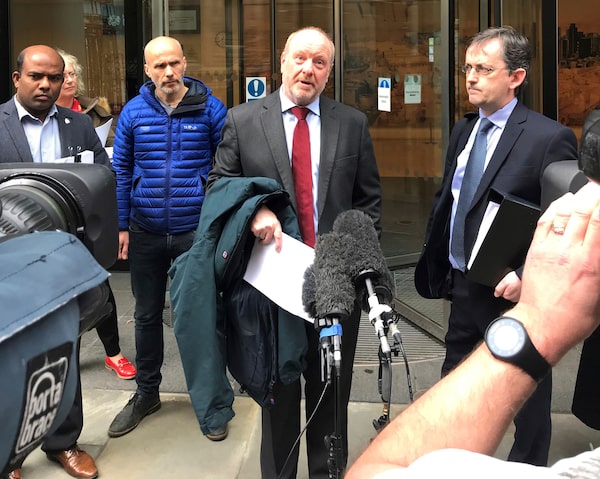
Lead claimant Alan Bates, centre, speaks outside the High Court in London, after the first judgment was handed down in claims against the Post Office over its computer system on March 15, 2019.Sam Tobin/The Associated Press
A popular television drama in Britain has not only attracted millions of viewers, it has prompted calls to exonerate the victims of a scandal that has gripped the country’s Post Office for more than 20 years.
U.K. to overturn wrongful convictions of former Post Office branch managers
Mr Bates vs. The Post Office tells the story of the hundreds of people who ran postal outlets in their communities and were held liable by the Post Office for financial shortfalls caused by a glitch in the company’s accounting software. Post Office executives refused to accept that the software was at fault and ruthlessly went after branch managers, demanding large repayments and pursuing criminal charges.
A total of 700 managers, known as sub-postmasters, were convicted of theft, false accounting or fraud between 1999 and 2015, and dozens served jail time. Hundreds more lost their homes and livelihoods trying to pay back the missing money, and at least three suicides have been linked to the scandal.
In 2019, High Court Judge Peter Fraser ruled that the sub-postmasters were not to blame for the financial discrepancies and said the Post Office’s repeated denials about the software defects amounted to “the 21st-century equivalent of maintaining that the Earth is flat.”
The Criminal Cases Review Commission, an independent body funded by the government that reviews miscarriages of justice, has described the scandal as the “biggest single series of wrongful convictions in British legal history.”
The CCRC has been referring cases to the appeal courts on the grounds of abuse of process. However, the agency said it’s a painstaking process. So far, only 93 convictions have been overturned and just 30 people have received full settlements under a compensation scheme set up by the Post Office and the government, which owns the company.
Since the TV show’s four episodes began airing on ITV last week, the impact has been profound.
On Monday, Prime Minister Rishi Sunak promised to improve the compensation process, with the government now under pressure to overturn all the convictions. “People should know that we are on it and we want to make this right, that money has been set aside,” Mr. Sunak told a group of businesspeople in Lancashire. “What we are now looking at is how can we speed all of that up.”
London’s Metropolitan Police Service has launched an investigation into potential charges of fraud, perjury and perverting the course of justice arising from the prosecutions and the recovery of money from the sub-postmasters.
There have also been calls to strip the Post Office’s former chief executive officer Paula Vennells of the Commander of the British Empire award she received in 2019 when she stepped down as CEO after seven years. More than one million people have signed an online petition demanding that she lose the title, and on Monday Mr. Sunak and several cabinet ministers expressed support for revoking it.
The TV show “has really ignited the whole issue again, and hopefully we can try and bring some conclusion to some of the issues that are still outstanding now,” said Alan Bates, a former sub-postmaster who created the Justice for Subpostmasters Alliance and is portrayed on the show by veteran actor Toby Jones.
A public inquiry into the scandal, headed by retired judge Wyn Williams, has been under way for two years and is expected to conclude this year. Mr. Williams has heard from dozens of sub-postmasters whose lives have been ruined.
Janine Powell said she noticed problems with the software shortly after she took over as a sub-postmaster in 2005 at a Post Office branch in Tiverton, a small town in South West England. The Post Office is separate from Royal Mail, the delivery service that was privatized in 2013.
The software, called Horizon, had been developed by International Computers Ltd. (ICL) to handle a variety of customer transactions, from selling a book of stamps to processing payments of utility bills. The Post Office rolled out Horizon to some 14,000 branches in 1999. Three years later, ICL, which had been created by the British government in 1968, was acquired by Japan’s Fujitsu.
Like hundreds of other sub-postmasters, Ms. Powell found regular shortfalls in her branch’s account. “I would go through the accounts with colleagues, and we couldn’t work out where these discrepancies came from,” she said in a witness statement. She reported the issues to the area manager, but no one seemed to care. “It was like they needed someone to blame,” she said. “They chose me, and that was it.”
The Post Office accused her of stealing £74,000, or about $126,000, and summoned the police. Post Office lawyers pressured her to plead guilty to false accounting and promised to drop the more serious charge of theft. Ms. Powell refused. “I had never stolen anything before in my life and had never been in trouble with the police.”
The case went to trial in 2008, and Ms. Powell was convicted of theft. She was sentenced to 18 months in jail and had to leave her three children in the care of friends. She served five months in jail and spent another three wearing an electronic tag.
After the completion of her sentence, she was ashamed to be seen in public around Tiverton, and her criminal record made it almost impossible to find work. She suffered from depression and self-harm and had thoughts of suicide. “I could never escape my conviction despite the many years that had passed.”
Her conviction was finally quashed in 2021. Now 51, Ms. Powell has found work as a bar manager in a hotel far from Tiverton, on the Isle of Wight.
 Paul Waldie
Paul Waldie